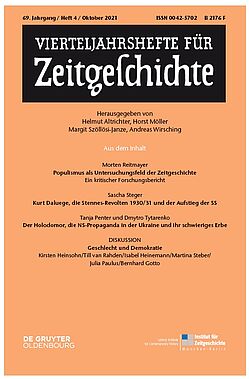- The Institute
- Research
- Dictatorships in the 20th Century
- Democracies and their Historical Self-Perceptions
- Transformations in Most Recent History
- International and Transnational Relations
- Edited Source Collections
- Dissertation Projects
- Completed Projects
- Dokumentation Obersalzberg
- Center for Holocaust Studies
- Berlin Center for Cold War Studies
- Publications
- Vierteljahrshefte
- The Archives
- Library
- Center for Holocaust Studies
- News
- Dates
- Press
- Recent Publications
- News from the Institute
- Topics
- Munich 1972
- Confronting Decline
- Feminist, Pacifist, Provocateur
- Der Mauerbau als Audiowalk
- Digital Contemporary History
- Transportation in Germany
- Envisaged Futures at the End of the Cold War
- From the Reichsbank to the Bundesbank
- German Federal Chancellery
- History of Sustainabilities: Discourses and Practices since the 1970s
- Changing Work
- Democratic Culture and the Nazi Past
- The History of the Treuhandanstalt
- Foreign Policy Documentation (AAPD)
- Dokumentation Obersalzberg
- Hitler, Mein Kampf. A Critical Edition
- "Man hört, man spricht"
Issue 4/2021
Content Overview: English Titles and Abstracts:
- Morten Reitmayer, Populism as a Field of Study of Contemporary History. A Critical Research Report. - A deeper look into the issue
- Sascha Steger, Kurt Daluege, the Stennes Revolts 1930/31 and the Rise of the SS. - Newspaper Article Welt am Sonntag
- Tanja Penter/Dmytro Tytarenko, The Holodomor, Nazi Propaganda in Ukraine and its Difficult Legacy.
- Discussion: Gender and Democracy. Interpretative Struggles about the Social Order in the Federal Republic of Germany: Kirsten Heinsohn, Till van Rahden, Isabel Heinemann, Martina Steber, Julia Paulus, Bernhard Gotto - A deeper look into the issue, Lecture
Abstracts
Morten Reitmayer, Populism as a Field of Study of Contemporary History. A Critical Research Report
The article discusses various definitions of populism from recent international political science and social science literature. It argues for caution in the unquestioning adoption of political science definitions of populism, especially since there are currently conflicting definitions of the term: On the one hand, there is an influential current that sees populism as a weak, “thin” ideology. On the other hand, populism is understood as a strategy for gaining power and mobilising the masses. In addition, there is hardly any empirically confirmed knowledge about one of the central assumptions of almost all populism definitions, namely that it is anti-elitism at its core. Finally, the article formulates fields and guiding questions for contemporary historical research on populism based on these and other conceptual problems.
Sascha Steger, Kurt Daluege, the Stennes Revolts 1930/31 and the Rise of the SS
In 1930 and 1931, two revolts by SA Leader Walter Stennes shook the Nazi Movement as it was in permanent campaign mode. The East German SS under Kurt Daluege claimed the quick suppression of both party crises for itself and disseminated the tale, that Hitler had awarded the rising SS with the motto “Meine Ehre heißt Treue” (My Honour is Called Loyalty) in order to thank it for its sacrificial deployment against the rebels. Sascha Steger puts this narrative, which is efficacious to date, to the test, analyses the actual course of the Stennes revolts and comes to the conclusion that, while the SS under Daluege was loyal to the Führer, it played no decisive role in ending the confrontation.
Tanja Penter/Dmytro Tytarenko, The Holodomor, Nazi Propaganda in Ukraine and its Difficult Legacy
Tanja Penter and Dmytro Tytarenko illuminate a hitherto neglected aspect in the history of German-Ukrainian relations connected to the Great Famine of 1932/33. They investigate how the hunger catastrophe in Ukraine was covered by the press issued under German occupation between 1941 and 1944, when the topic, which one could not speak about in public under Stalin, was first discussed publicly and instrumentalised for propaganda. Starting from an analysis of the press publications they inter alia ask what image the occupiers transmitted about the famine and whether the legacy of this propagandistic instrumentalisation of the crime has left any traces in Ukrainian commemorative culture.
Discussion: Gender and Democracy. Interpretative Struggles about the Social Order in the Federal Republic of Germany
The history of democracy of the Federal Republic of Germany has been characterized by bitter confrontations over gender orders. Notions of a natural or just gender order not only entered the West German constitution, but they also shaped the political functioning of democratic institutions and fashioned the way democratic principles were adopted and internalized on a day-to-day basis. From the start, these concepts were heavily contested. By introducing six different research perspectives the authors explore how the production of gender as a social category and the establishment and practice of democracy were inextricably intertwined during the first decades of the Federal Republic. Focusing on contested gender orders allows a better understanding of the inner contradictions and tensions of the West German democratic project.









